Celebrating a Special Bond

Waterfowl hunters share a unique connection with their retrievers
The dog is a lanky, curly haired, rather goofy fellow, and yet he prances around the dinner party with all the hypoallergenic confidence in the world. It’s a Labradoodle, I’m informed, and my wife elbows my ribs upon suggestion that whoever’s Lab had an illicit affair with the neighbor’s poodle is a marketing genius. Then it happens: The pup nudges my hand, I cup his cheek and give him a scratch behind the ears.
We can’t help but love dogs, even those we’d just as soon not. It’s a powerful bond, and an ancient one — archaeologists have discovered humans buried with their dogs in graves dating 12,000 to 14,000 years ago. And have you ever accidentally called a loved one by your dog’s name? There’s a reason for that: Research at Duke University suggests dog names are stored in the family region of our brains, although interestingly, the slip of the tongue almost never occurs with cats (draw your own conclusion).
While I’m certain my friend adores his frisbee-fetcher, I wonder if there’s a “normal dog” equivalent to the love reciprocated by a duck dog — a bond galvanized through each minute shared in the blind, every mallard delivered to hand and a shared passion for hunting waterfowl. The result? A dog whose desire to please you surpasses even his love of a duck in his mouth, and who — if we’re being honest — you love more than most people.
That is a bond worth celebrating, and if you aim to achieve it, it’s helpful to understand the mix of psychology and chemistry affecting the relationship. So let’s take a dive into the science of the hunter-retriever bond, examine methods used by accomplished trainers to strengthen it, and applaud the feats of loyal retrievers.

Establishing the Bond
The black Lab sat on his place-board in the pre-dawn light, but restlessness was getting the better of him. His eyes, firmly glued to Clay Thompson, category manager of SportDOG Brand e-collars, told the story.
“Skeeter just couldn’t stand it if I didn’t pay attention to him,” Thompson said. “All of a sudden we’d be hip to hip with his eyes to the skies, like, ‘OK boss we’re in this together and I’m going see those greenheads before you do,’ which he often did. There were times he anticipated what I would do next before I knew, so he was always ready. It was like Fred and Ginger — you don’t know who’s leading because they dance so gracefully.”
Thompson credits the connection to thousands of hours spent together, beginning at an early age. Young Skeeter, Thompson’s first Lab, went to the post office, the hardware store and even met the dentist.
“I’m so glad people told me it was OK for a hunting dog to live in the house and ride on the seat of my truck,” Thompson said. “I think that also helped his focus when it was ‘go time,’ because he didn’t enter the field starved for my attention.”
Do as Thompson did, but don’t overthink a pup’s socialization. The methods are far less critical than investing adequate time with your pup to foster a sense of safety, routine, trust, and ultimately, adoration.
“The fun thing is people have been pretty good at bonding with dogs for thousands of years,” said Dr. Brian Hare, founder of Duke University’s Canine Cognition Center. “But I do think that early socialization, making puppyhood very fun, and ensuring lots of positive interactions around people is a wonderful way to strengthen the bond. And what’s nice about dogs, but not true of wolves, is that puppies that bond with a human tend to translate that positivity to people they’ve never met before.”
That’s a compelling added benefit given the social nature of many duck hunts.

It’s in the Eyes
The bonding process varies among individual dogs. Some are a challenge to reach, particularly if they’re left unattended during the work week. Others, well, it’s like they were put on this earth to love and satisfy you.
“We got a new dog in today and she’s as wild as a March hare,” said Steve Biggers, owner of Rocky Creek Retrievers in Brenham, Texas. “But when she looks at you, her ears perk up and she looks you dead in the eye. That eye contact is a sure sign of a dog that just wants to retrieve and please you. It’s a genetic, God-given talent, and I think that desire to please, that bond, that’s what makes the great ones great.”
Biggers saw this potential in a chocolate Lab named Woody, his first of several world-class retrievers, and his constant companion while guiding duck hunters from 1985 to 1995. Biggers especially recalls the morning that a client’s pellets grazed a mottled duck — a notoriously elusive bird when crippled — sailing it hundreds of yards behind the blind into grass-choked waters. Woody tore off, slinging spray until he was out of sight.
“I didn’t think we’d ever come up with the duck,” Biggers said. “We shot a couple more volleys, and still Woody didn’t come back, so I planned to launch the boat to go get him. Then here he came with the mottled duck, one wing barely clipped. He was so proud and I was so proud. He didn’t want to give up, because we were a team, and he wanted to bring that duck to me.”

Bonding Hormones
The eye contact Biggers notes plays a greater role in the bonding process than previously known. In 2015, researchers at Azabu University in Japan found that when dogs stare into their owners’ eyes, both experience a spike in oxytocin — the same bonding hormone that surges in mothers’ brains when they gaze into the eyes of their children. Dogs that maintained longer eye contact received an added rush of oxytocin, as did their owners. However, captive wolves avoided eye contact during the experiment, suggesting that dogs somehow adopted the human physiological response during their evolution, further fueling our deep-rooted feelings of love and friendship.
It’s also among the reasons why dogs make such good teammates.
“Many of the cooperative communicative abilities dogs possess — like eye contact, the oxytocin loop, and reading our gestures and emotions — are the same types of abilities that begin to appear in 9- to 12-month-old infants and are absolutely fundamental to language acquisition,” Hare said. “Dogs therefore have some of the same non-verbal abilities that we think are fundamental to becoming a human. They can cooperate and communicate with us in ways other animals can’t. Assistance dogs, Marine Corps dogs searching for bombs and dogs retrieving ducks are all built on that foundation.”
In addition to oxytocin, when you look into your retriever’s eyes, rub his belly or toss him a few playful “fun bumpers,” both you and your dog experience a reduction in the stress-hormone cortisol, plus a boost of the happiness-inducing hormones norepinephrine and prolactin. So, spend time with your dog. And remember, he isn’t glaring at you when you miss — he’s just trying to cheer you up.

Growing the Bond
Given this research into the canine-human bond, it makes sense that many pro trainers espouse the merits of extended “pack runs” — allowing a group of dogs to trot about cheerfully as a trainer walks along or rides an ATV. In addition to maintaining physical fitness, the dogs have a grand old time, check in with eye contact, and further bond with their trainers by virtue of the time shared. A leash can also work.
“Nothing beats the therapy for dog and owner as a nice, long walk,” Biggers said. “It’s just the ultimate to build a bond with a dog.”
The walks also serve as a carefree counterweight to the rigors of training. However, that is not to suggest that setting rules and expectations weakens the bond. A dog that knows its boundaries will love its pack leader.
“I don’t think an untrained dog can really show a true bond,” said Jeff Pelayo, a former Delta Waterfowl student and owner of AWA Gun Dogs in Jamestown, North Dakota. “Dogs that break a lot, guys that yell and their dogs don’t listen, to me that’s not a strong bond. Those dogs aren’t trying to please you, they’re pleasing themselves, versus a dog that handles and runs blinds — that dog is working for you.”
Perhaps it’s a chicken and egg thing. Are dogs prone to bonding in turn more obedient, does the long journey required to “finish” a retriever lead to an enhanced relationship, or is it a combination of both? Regardless, Pelayo argues the bond cannot reach its full potential without dedicated training exercises.
“When a dog understands its job, your relationship grows that much closer,” he said. “When you take a dog through advanced training and you hunt hard all season long, they do or start to do things because they want to please you. A lot of guys hunt with basically untrained dogs. But when your dog can be directed to a fall and act as a teammate, that didn’t just happen overnight. That’s special.”

Unique Bonds
The 50-pound springer fights the swift, rain-swelled creek, weighed down by the fattest greenhead I’ve shot in years. His eyes ought to be navigating his next move through the flotsam, but instead they’re fixed on mine, and in them I see satisfaction, intelligence, and yes, love. He reaches me, sits, and without ever breaking his gaze, gingerly delivers that which he values most.
Ask a guy why he hunts with dogs, and he’s likely to use the phrase “conservation tool.” And it’s true that almost every hunt when a few ducks are shot, a skilled retriever will find a bird or two that would’ve otherwise fed patrolling foxes. But aren’t the motivations deeper than that?
There’s an academic term — “descent with modification” — which describes a species that has split from an ancestor while preserving certain characteristics. My dogs are no longer wolves, as evidenced by their patience with my sister’s cat. And no Neanderthal would’ve worn my sport jacket to church on Sunday. Yet I offer: Have waterfowlers and their retrievers not retained the healthy survival instinct to hunt, kill and eat? And when their teamwork results in the fulfillment of this natural inclination, do they not love each other all the more?
“I definitely think the bond with a hunting dog is unique,” Biggers said. “Any dog may bond with you, but a hunting dog brings back a prize for both of you. We have a farm dog here and he’s a sweet animal and we have a good relationship. But he doesn’t share in the ups and downs, the great retrieves and missed ducks, season after season with me. That’s what makes the relationship with a hunting dog so special.”
Special, sure. But unique?
We waterfowlers are biased of course, in our love for our dogs and passion for duck hunting. But our canine relationships are arguably outmatched: Some people depend on hunting dogs for the survival of their families.
“I travel to central Africa to work with chimpanzees and bonobos, and one place is deep in the Congo Basin where there are many basenjis [20-pound, terrier-like hunting dogs],” Hare said. “The people who live there don’t use their basenjis for fun, it’s how they survive. One hunter I met had tears in his eyes as he said he would sacrifice one of his children before his best dog. The whole family relied on that dog.”
Then there are the dogs that protect us here in North America.
“Service dogs, K-9 units, drug-sniffing dogs, military dogs — they’re highly trained dogs spending day in and day out in the field working for their country, so I have no doubt they have strong bonds with their owners,” Pelayo said. “I think hunting, yeah it’s one way to develop a special bond and it’s strong, but I think other activities can parallel that relationship.”

Saying Goodbye
SportDOG’s Thompson knew the painful reality: Skeeter was likely riding shotgun to his final hunt. But the mallards that had piled into a tiny slough the day before promised chip shots and easy retrieves — an ideal finale to the 13-year-old black’s grand career. Then Thompson’s headlights shone upon 500 mallards that had unexpectedly roosted in the skinny water. They didn’t stick around.
“It wasn’t going to be a grind-out-a-limit kind of day,” Thompson said. “My goal became shooting just one more duck for Skeeter.”
For a while they merely enjoyed one another’s company, quietly revisiting memories only Thompson and Skeeter could appreciate. Then, what would’ve been an unremarkable duck on any other day crested the horizon.
“A little hen wigeon cruised the decoys and I cleanly dropped her where Skeeter could see it,” Thompson said. “He went out, got the duck and spent the next 20 minutes whining and crying behind me. Watching that old fart whose heart was there but his body was not, wanting another duck so badly, it was just awesome.”
The hunt did indeed prove Skeeter’s last, and as Thompson and I discussed it over India Pale Ales, I failed to hide the moisture welling in my eyes. I’d shot a few ducks over Skeeter and so mourned him directly, but also, I thought of my own concluded bonds with canines. There was Rocky, a yellow Lab and the first dog I ever loved, who we buried with shotgun shells and duck feathers on the only night I ever saw my father cry. Then came Luke, Colby, Rambler, Dude, Freedom and sundry others I’ll miss the rest of this life.
Why do we do this to ourselves, every 10 to 15 years, when psychologists have concluded that grieving a dog truly is akin to losing a family member? Because, I argue, the love of a dog, particularly one that lives to hunt ducks and make us smile, is damn sure worth it.
“I had hunted ducks before Skeeter,” Thompson said. “But he made me. He made me a duck hunter.”
– Kyle Wintersteen dedicates this piece in memory of FC Sunrise First Freedom.

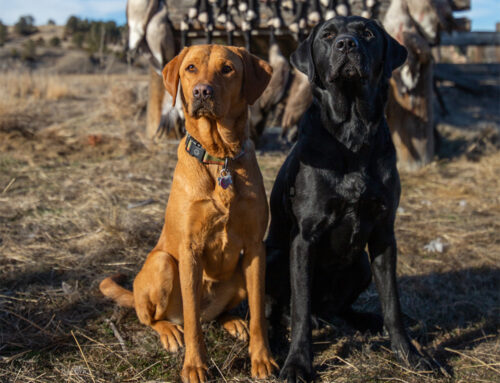
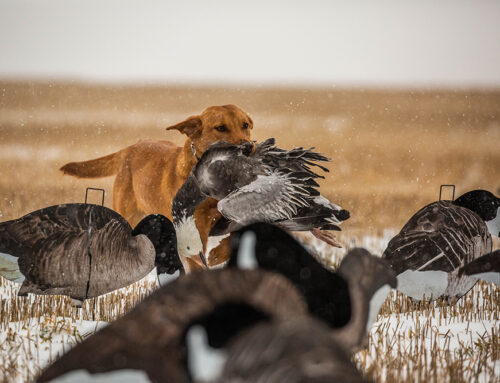
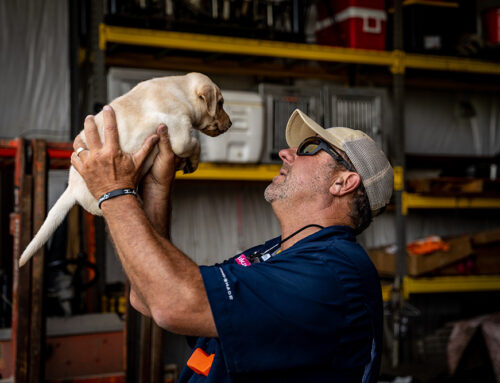
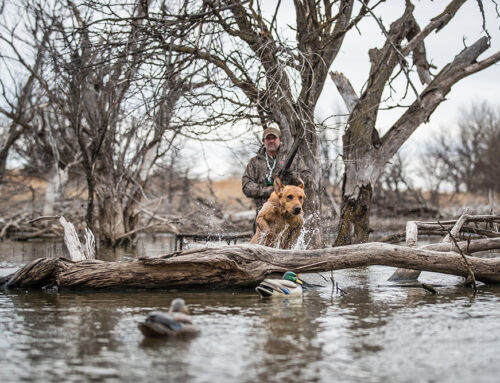
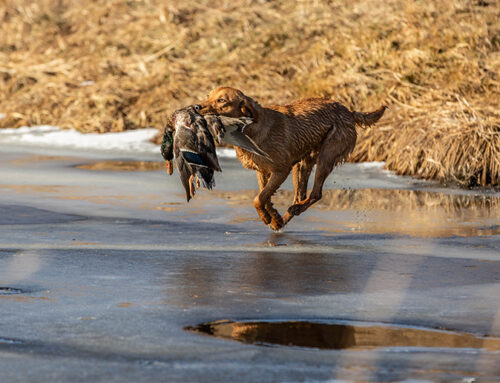
Leave A Comment